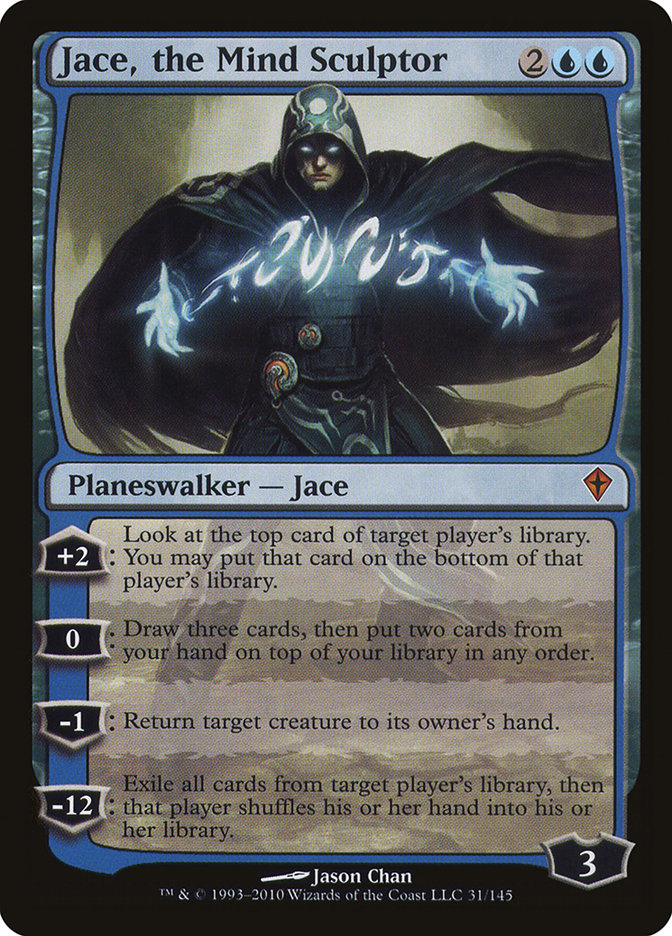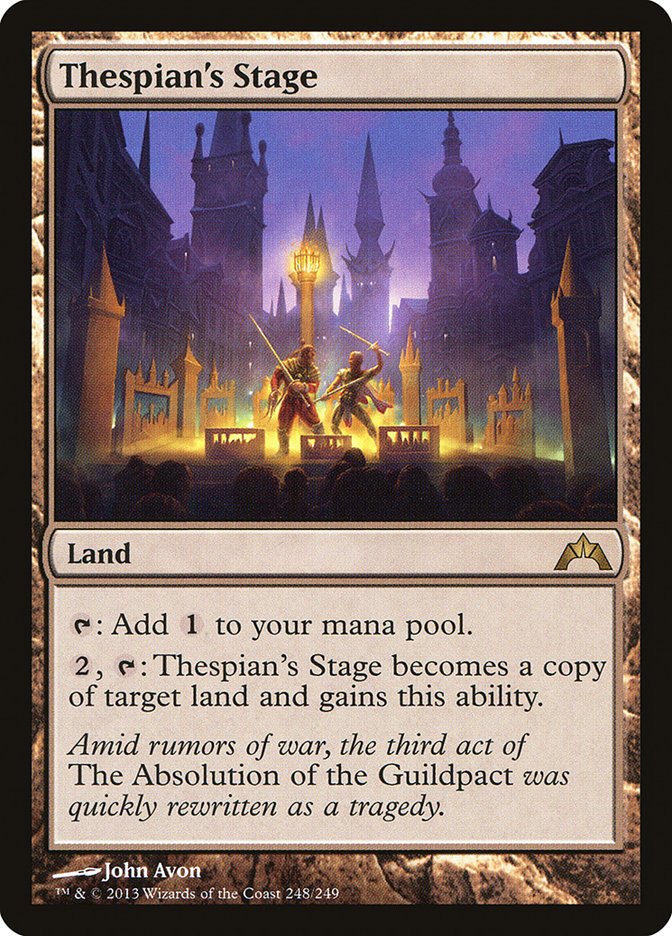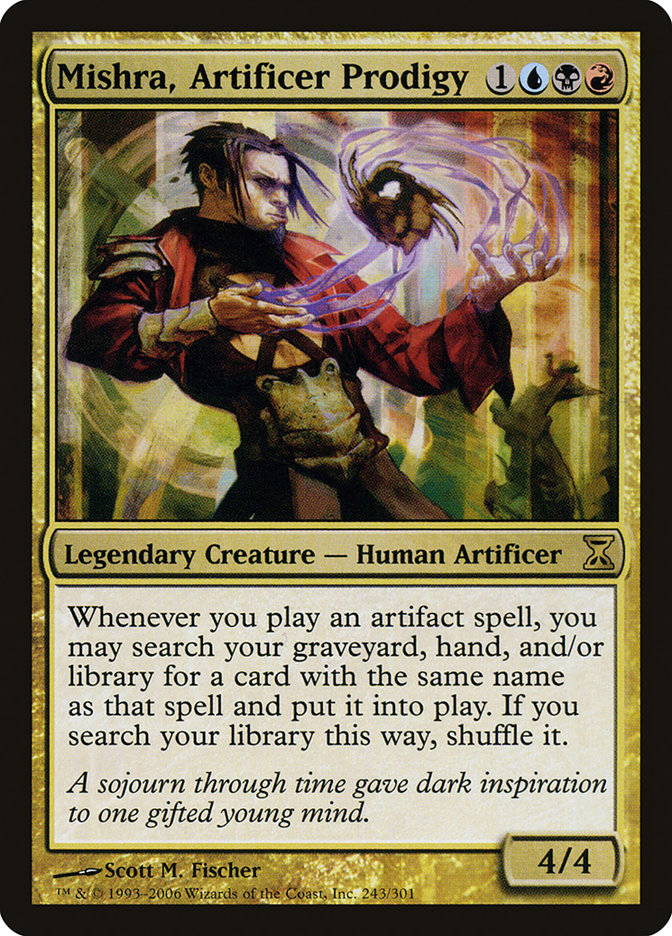As I’ve expressed in a few of my articles for This Here Site Here, I’m a bit of an opera buff (Exhibit A | Exhibit B | Exhibit C). I just bought a two-ticket subscription to The Dallas Opera, cheap seats but plenty fine for the likes of me.
Because I’m also a Magic buff, more than one opera program in my apartment has decklist notes scribbled in the margins. I make wealthy benefactors’ names mingle with the likes of 4 Elvish Mystic and 4 Jace, the Mind Sculptor.
One of him costs more than a basic three-performance subscription to The Dallas Opera. Not joking.
Aside from that tenuous connection, I didn’t really put opera and Magic together until a few days ago. The next opera I’m going to see, Death and the Powers, tells a science-fiction story (billionaire downloads consciousness into computer system and tries to get family to follow him).
There’s also an opera written in Klingon.
New operas are written every year and get tryouts in festivals such as Fort Worth Opera’s “Frontiers.” There are also several opera-commissioning programs associated with top houses such as the famous Metropolitan Opera in New York City.
If there are new operas being written and Star Trek isn’t off limits, why not fantasy?
Why not Magic?
Ante’s banned, dude. Go away.
The intellectual property side of things would have to be settled before anyone writes the first note. Departmental reviews and an S&P 500 company‘s legal team are nothing to mess with. Clear that hurdle and a Magic opera would be plausible—not easy, but plausible.
What makes me so sure? In the years following World War II, major American companies commissioned musicals about themselves. To give just one example, in 1973 General Electric put on a show titled Got to Investigate Silicones. It’s not what you think.
The so-called “industrial musicals” are a great proof of concept. If songwriters could make Broadway style productions about Oldsmobiles in the 1950s, Magic can be made to fit song and stage.
There’s a rich tradition of mythological characters and magic wielders in opera, from Rusalka (which might bring to mind a certain cycle of cards in Ravnica) to the weird mash up of magic and enlightenment in The Magic Flute. One of the most fantastic operas of all, The Last Sorcerer, features a running battle between a once-powerful wizard and his seriously ticked-off elvish neighbors. On a lighter note, The Sorcereris an early comic opera by the famous team of Gilbert and Sullivan. After twenty years, Magic has its own array of stories to tell, suitable for various “sizes” of opera.
Go Big Or Go . . . Small?
How many singers are required for an opera? Technically zero, with one-singer operas perfectly viable. How long does an opera have to be? Ten minutes is enough time for (a fictional) Paula Deen to choke to death on a doughnut sandwich, get denied entrance to Heaven, and make two angels fall with her decadent cuisine in Krispy Kremes and Butter Queens, an opera that also happens to require just a piano for instrumentation.
For now I will focus on “smaller” operas, not necessarily ten-minutes short but not several-hour (or several-day!) extravaganzas either. Those might come in time, but staging any opera is an ambitious enough goal. Best to start small: a few voices, a few instruments, and a bit of the audience’s time.
Choosing A Story
The written-out story of an opera, its libretto, is of secondary importance to the music. Carmen has songs even non-enthusiasts would recognize—the “Habanera,” the “Toreador Song“—but its story is surprisingly pedestrian. Ever been to a movie and wondered how it got made with such a cruddy script? That’s not new to Hollywood. Even the great Mozart once had to deal with a librettist who didn’t know what he was doing.
For this article, I’ll focus on the older pre-Mirrodin stories of Magic. This isn’t because I consider them inherently better than more recent tales but because earlier storylines are less likely to be the subject of a Magic: The Gathering movie. The same Hollywood deal that led to a film based on the boardgame Battleship and promises flicks based on Ouija, Candy Land, and Monopoly also covered Magic: The Gathering. I don’t know exactly why Magic wasn’t chosen. Perhaps the Dungeons & Dragons movie from 2000 and its poor box-office performance made a studio executive leery.
A movie about Jace Beleren seems more plausible than one about Commodore Guff or Bo Levar, so I’ll leave the Modern era settings and characters alone. Render unto Caesar and all that. Fortunately the earlier storylines have plenty of material to mine.
Option 1: “The Love Song Of Night And Day”
“The Love Song of Night and Day” is on the shortlist of Magic: The Gathering’s greatest creative works. Jenny Scott, a member of the worldbuilding team for the Mirage block setting of Jamuraa, wrote the poem. Eventually seventeen excerpts from it were used as flavor text. Here’s how Geordie Tait described her accomplishment in a 2010 article:
“What did she do?
All she [did] was sit down and write a poem from the perspective of a poet from a world that doesn’t exist in a style, voice, and tone that explained exactly what the set was aesthetically about at a level of excellence publishable in any forum, let alone the tiny fishbowl of Magic: The Gathering exposition.
That’s all.”
There is a long tradition of setting poetry to music in the West. The War Requiem of Benjamin Britten incorporates seven sonnets by Wilfred Owen, including “Anthem for Doomed Youth.”
“The Love Song of Night and Day” offers the simplest route toward a Magic: The Gathering opera. Unlike other stories where a libretto would have to be written from scratch, it is preexisting poetry that would require only minimal adaptation. After a flawless rhythmic run of eight iambs (da-DA-da-DA and so on) in the line “The dwarves will beat their funny drums of zebra skins and hollowed trees,” the word “stiltwalkers” sticks a bit in the craw if one is speaking or singing it out loud. The line containing “stiltwalkers” reads beautifully, but there’s a difference between page and stage.
With only two characters, Night (a male role) and Day (female), personnel shouldn’t be terribly difficult depending on the composer’s wishes. Because both of the roles are leading rather than support, chances are neither will be in the lowest range, bass for male and contralto for female. Unfairly or not, the stereotype of a contralto character being viciously unpleasant and a bass being comic relief would work against using either in a serious piece about romance and loss.
On Day’s side, the “viciously unpleasant” stereotype also applies somewhat to the lower-voiced mezzo-soprano. Day is an initiated warrior, a practical woman of great strength, so I just don’t see her as a soprano of any kind. Night could be a tenor, but that would bias the audience unintentionally toward Night and against Day in a story where there’s no one at fault. A baritone Night seems best.
Scenery doesn’t have to be complex. A campfire and a few dishes would be enough, and a clever director could make do with even less. I imagine considerable movement around the stage as Night and Day reenact their youthful games. As for the music . . . show respect and give it your best. That’s all I’d have to say to the composer.
Option 2: The Brothers’ War
Any opera that tried to tell the entire history of Urza Planeswalker and his millennia of schemes would stretch far longer than even Richard Wagner’s infamously long Ring Cycle. Even one of the relatively short chapters in his life would make for a good evening’s worth of entertainment. Among Magic novels, The Brothers’ War by Jeff Grubb is one of the most acclaimed. Its story elements include intense sibling rivalry, a contest to marry a leader’s daughter, and betrayal, all familiar to operagoers.
With more bodies onstage, a longer runtime, and a greater need for visual effects, The Brothers’ War as an opera would be a far more complex undertaking than “The Love Song of Night and Day.”
The playbill synopsis for an operatic version of The Brothers’ War might go something like this:
Act I
URZA, a mechanical genius, works as an apprentice to the clockmaker RUSKO. The youthful Urza broods over an accident in his past that left him with half of a powerful artifact but severed him forever from his younger brother MISHRA. Rusko, knowing Urza’s gifts and misery, tells his apprentice of a challenge. The WARLORD of Yotia has offered his daughter’s hand in marriage to whoever can move a giant statue from its resting place. Urza is uninterested until Rusko mentions a rare book, part of the daughter’s dowry, that could shed light on the artifact and the incident that divided the brothers. Urza takes on the challenge and dreams of a mechanical man to move the statue.
Urza shows his mechanical man to the Warlord and uses it to move the statue with ease. The Warlord, enthralled by the idea of an army of such golems, agrees to the marriage on one condition: that Urza build machines to conquer the nation of Fallaji and their leader the QADIR.
Act II
Urza has built up an array of military contraptions for the Warlord. Unbeknownst to Urza, the Warlord plans to use them to achieve victory, not on the open battlefield but with the utmost treachery, when the Qadir visits the Warlord for what is supposed to be a peace conference.
On the day of the meeting, the Warlord and Urza come face to face with the Qadir, who has his own mechanical genius at his side: Mishra. The younger brother has tamed a legendary war machine, a dragon engine, and flaunts it. Urza, envious, keeps himself out of the leaders’ peace talks. The Warlord tries his treachery. Flying machines designed by Urza try to bombard the Qadir’s security detail, but Mishra’s dragon engine strikes them from the skies. The Warlord attacks the Qadir himself but is killed before he can land a blow. Mishra curses his brother, and in the name of Fallaji declares war. Mishra departs with his dragon engine, leaving Urza alone with the ruins of his machines.
Finale
I hope you’ve enjoyed this look at what a Magic: The Gathering opera might be. Western musical “high” culture and gamer culture have interacted in myriad ways over the years, includingorchestral concerts such as Video Games Live and crossover successes such as the Grammy-winning “Baba Yetu” from Civilization IV, not to mention Noah Long of ballet and Booster Draft fame. A Magic opera may well be an idea whose time has come.
Join me in two weeks, when I’ll discuss a classic Bugs Bunny cartoon, Alexander Pushkin’s short story “The Queen of Spades,” or Magic. Probably Magic.
— JDB
@jdbeety on Twitter






